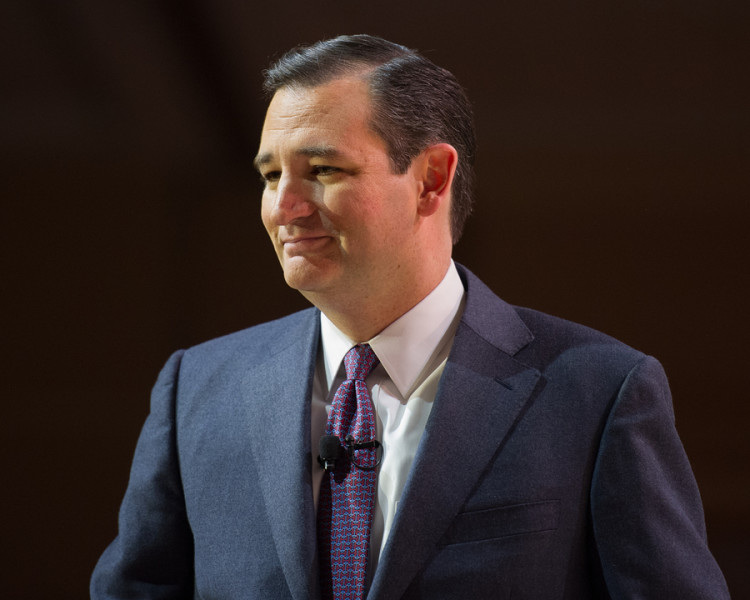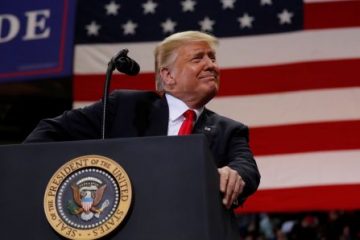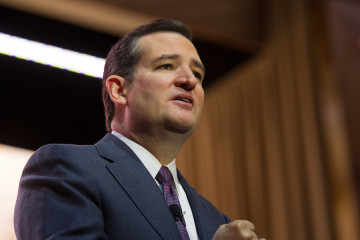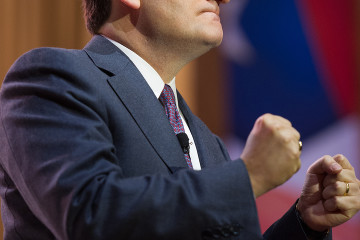Trump Wins Five Super Tuesday States as Ted Cruz Takes Texas

©2016 Bloomberg News
O3E33W6TTDSR
(Bloomberg) — Republican Donald Trump will take at least five states as he heads toward a commanding Super Tuesday showing that will give him a firmer grip on the party’s presidential nomination that will become increasingly difficult for his rivals to break.
Texas Senator Ted Cruz denied the real estate mogul a Super Tuesday sweep, winning his home state, according to multiple networks. The win is likely to keep Cruz’s presidential bid alive at least through the next big slate of contests on March 15.
The real estate mogul and former reality television star won in Virginia, a state where Senator Marco Rubio aggressively campaigned and was thought to have one of his better chances of pulling off his first state win. Rubio still has yet to win a single contest.
Besides Virginia, Trump is also projected to win Georgia, Alabama, Massachusetts and Tennessee.
In Vermont, the race is too close to call between Trump and Ohio Governor John Kasich, CBS News and NBC News said.
The Super Tuesday outcome across 11 states will represent the closest thing yet to a national referendum on Trump, the brash New York billionaire who has thrown out the traditional rules of campaigning. It will also provide a look at whether a tag-team assault by his two top rivals, Rubio and Cruz, has tarnished his appeal.
In all of the states, the raw vote totals will be telling, but more important are the delegates awarded under varying rules in the states. Other states being contested by Republicans on Tuesday include Alaska, Arkansas, Minnesota and Oklahoma.
In Texas, preliminary exit polling data posted by ABC News showed two-thirds of Republican voters said they’d be satisfied with Cruz as the nominee, compared with nearly six in 10 for Rubio and less than half for Trump.
State officials reported strong turnout as the biggest day yet in the 2016 campaign drew to a close and a divisive Republican Party battle continued to simmer over the front- runner and future of the party.
Compared to primaries in the last two presidential campaigns, higher turnout appeared to be more the rule than the exception. In Minnesota, Republican leaders told local volunteers to prepare for twice as many caucus-goers as the roughly 65,000 seen in 2008. In Georgia, more than 417,000 ballots were cast early, breaking the 2008 record of about 271,000 early votes, according to the secretary of state. Republicans cast about 100,000 more of those early ballots than Democrats.
Trump entered the day with all the momentum and a string of three dominant victories behind him, in New Hampshire, South Carolina and Nevada. He continues to benefit from a splintering of support for his rivals, along with leaders of the party establishment.
The real-estate mogul is leading in the polls virtually everywhere on Super Tuesday except Texas — a critical test for Cruz, who was trying to avoid an embarrassing and potentially campaign-ending loss in his home state. Cruz and Rubio ratcheted up their personal and professional attacks on the front-runner in recent days as their party struggled to agree on whether and how to stop him.
The situation has left some establishment Republicans openly questioning whether their fractured party is headed for disaster in November, should Trump win the nomination. A poll released Tuesday by CNN showed Democratic frontrunner Hillary Clinton beating Trump 52 percent to 44 percent among registered voters in a hypothetical general-election contest. Against Rubio and Cruz, she narrowly trailed.
The Republican dismay is fueled, in part, by Trump’s initial failure to repudiate the support of former Ku Klux Klan leader David Duke in a weekend TV interview. He and his aides played clean-up on that and other issues Tuesday.
“There’s nobody that’s done so much for equality as I have,” Trump said on ABC. “You take a look at Palm Beach, Florida: I built the Mar-A-Lago club, totally open to everybody.”
Retired neurosurgeon Ben Carson called for a private meeting with his fellow candidates in Detroit before a Fox News debate on Thursday. “The American People deserve so much more from the candidates who are seeking the most powerful position in the free world, and I share their concern that this race has taken a turn for the worse, to the point of embarrassment on the world stage,” he said in a news release.
The Super Tuesday contests — like those held in the first four states — will award delegates on a proportional basis, so winning some of the vote can translate to netting some of the 595 delegates at stake. The rules change starting with the March 15 contests, when states start awarding delegates on a winner- take-all basis. A total of 1,237 are needed to win the Republican nomination.
Crowds at precincts in Massachusetts reinforced Secretary of State William Galvin’s prediction of strong turnout there, especially among Republicans. Galvin, a Democrat, has said he thinks 700,000 of the state’s voters will take GOP ballots, including some Democrats who have left the party since the start of the year. That would shatter the record of 500,000 in the 2008 primary, when former Massachusetts Governor Mitt Romney first ran for president.
Anticipating high turnout, some school districts in northern Virginia closed Tuesday to accommodate the polling places that some of them host. “We came to vote against Trump,” said Irene Wittig, 71, who said she chose a Republican ballot for the first time in 50 years in order to oppose the billionaire. She said she voted for Kasich because he seems like the most reasonable Republican candidate, even though she wouldn’t vote for him in November, should he become the nominee.
The GOP sped up its nomination calendar after 2012 to avoid a repeat of the extended, messy fight that weakened their eventual nominee, Romney, that year. So far, it has benefited Trump and makes it hard for any of his rivals to catch up to his momentum.
For a party that once espoused Ronald Reagan’s so-called “11th commandment” of not attacking fellow Republicans, the GOP race has landed firmly in the gutter, with Rubio even questioning the size of Trump’s hands and, indirectly, his manliness.
The junior senator from Florida had pledged to run a sunny, upbeat campaign, but the dire situation has prompted him to go well beyond the Trump critiques leveled by his one-time mentor, former Florida Governor Jeb Bush, before his exit from the race.
Trump, who has ridden a wave of anger at the Washington establishment among voters who’ve felt left out of the political process, has also called a news conference in Florida for 9 p.m. at Mar-a-Lago.
Rubio and Kasich won’t face home-state contests until March 15, buying two weeks to try to gain ground against Trump before confronting the kind of win-or-go-home prospects Cruz faces on Tuesday night.
—With assistance from Ben Brody, Tom Moroney and Angela Greiling Keane.
To contact the reporter on this story: John McCormick in New York at jmccormick16@bloomberg.net To contact the editors responsible for this story: Craig Gordon at cgordon39@bloomberg.net Elizabeth Titus







No Comment